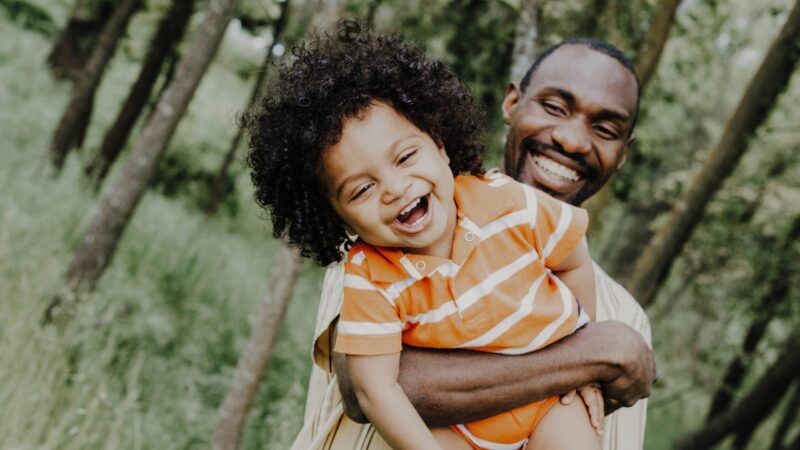COVID-19 Vaccination Should Not Be Legally Required for Parenthood
Only in extreme circumstances should a court come between a parent and their child.

A family court judge in Chicago denied a mother the right to custody over her son until she gets vaccinated against COVID-19, the implication being that an unvaccinated parent is not a fit parent. The ruling didn't hold long—the judge himself quickly reversed course—but the initial decision will be chilling for thousands of parents across the country. Making parental or child vaccination a requirement for custody would be an enormous judicial and government overreach, setting a dangerous precedent for intervention into what has traditionally been the realm of the family. This case may be a fluke, but parents engaged in custody disputes across the country should be aware that their vaccination status might play a role in determining whether they have access to their child.
This is not the first time judges have tried to use judicial power to convince the unwilling to get vaccinated. In Ohio, at least two judges have made vaccination a condition of probation; the defendants will face jail time if they do not get vaccinated. These cases might not attract the sympathy of many. People who are facing probation have, by definition, been convicted of crimes and lost at least some of their autonomy to the state. There is a well-established history of judges using "creative" punishments to try to reform defendants (usually through public humiliation).
Reasonable people can disagree about the degree to which judges can, or should, try to impose creative sentences, including coronavirus vaccine mandates, for defendants. People who have been convicted of crimes are human beings, and forcing someone to choose between being vaccinated against their will or going to prison should at the very least raise eyebrows. But using COVID-19 vaccination as a factor in decision-making at family court erases the autonomy of parents who have committed no crimes and might otherwise be thoughtful, loving guardians.
Parents who are hesitant to be vaccinated aren't the first to face judicial pressure because of their perceived failures as a parent. Christian Scientists, for example, traditionally refuse to receive all but the most limited medical care. This has had dire consequences: Christian Scientist parents who have failed to seek medical care for their children have been brought before courts to answer in criminal trials for their child's injury or death. Even so, state law has explicitly protected parents who choose to forego medical treatment for their children in favor of prayer and spiritual healing.
By contrast, parents with some habits as common as smoking might find themselves losing custody of a child. While exposure to second-hand smoke is undoubtedly harmful, so is the disruption of the parent-child relationship. The fact that custody can be lost due to smoking, while the law often explicitly protects faith-healing, demonstrates the inconsistency of the government when it acts in loco parentis. Courts may have only the best of intentions towards children and families, but in the massive family court system, values become muddled.
The Jehovah's Witnesses are another minority religious group with practices that have put them at odds with the American judiciary for their failure to raise their children the "right way." In a 1944 case, the Supreme Court upheld the conviction of a Jehovah's Witness mother who was accused of violating a Massachusetts child labor statute by having her young daughter distribute religious pamphlets. The parents would have been perfectly free to distribute pamphlets; the issue was simply whether their daughter could do so. The court wrote that "parents may be free to become martyrs themselves. But it does not follow they are free, in identical circumstances, to make martyrs of their children."
But the mother in the Chicago vaccination case did not want to make a martyr of her son. While her choice to not be vaccinated against COVID-19 may be unwise, its connection to her ability to be a good mother is limited at best. Even if the judge feared that the mother might contract COVID-19 and pass it on to her child, this is not an adequate basis for damaging a familial relationship. COVID-19 poses about the same risk to children that influenza does, but parents do not routinely lose custody of their children for opting out of their annual flu shot. Besides, as has become obvious thanks to the delta variant, even a vaccinated parent could get their unvaccinated child sick.
One may find the mother in this case to be foolish for choosing to endanger herself by not getting the vaccine. Unfortunately, for those who would like to make vaccination a condition of parenthood, mothers and fathers are routinely permitted to make any number of seemingly foolish decisions without losing access to their children. That's because the legal system generally recognizes the enormous damage that can be caused to a child by removing a parent from their life.
Every day, parents make decisions that others might consider unwise. Sometimes, they do so to the detriment of their child. But most of these people are still fundamentally loving parents despite their mistakes, and only in the most extreme of circumstances should courts tamper with the bond between parents and their children. The choice by a parent to refuse vaccination against the coronavirus does not rise to that level.


Show Comments (117)